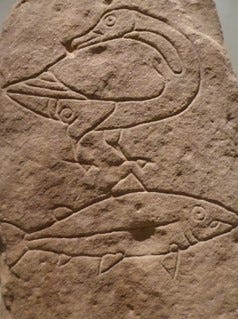PART 1: Leaping Across Time: Salmon, Heritage, and the Fight for Survival
Donald discusses the dynamism and fragilty of our salmon

My father was an obsessive, compulsive angler, brought up in the Angus glens he was never far from water and nearly every family holiday was to a remote cottage beside a Scottish loch or river. He was a skilled fisher too, rarely coming back with an empty bag, just that mention of the bag brings back the distinctive odour it held. At those holiday spots he would first hand out myself and my brothers our rods and send us off into the distance to catch our lunch or tea – if we caught and kept it we had to eat it. The first decent trout which I caught was a bit of a fraud. Whilst wandering up the burn on my own, rod in hand, ready to cast, when much to my astonishment there on the bank in front of me was a leaping and tossing brown trout! It was a very beautiful yellow bellied, darkly spotted shining fish. Naturally I grabbed it, gave it a clonk on the head and popped it into my fishing bag, leaving me as pleased as punch. In retrospect I believe that I may have disturbed an otter or heron about to have a good meal. I cannot imagine that it actually leapt out of the burn just for me, it is possible it made an over enthusiastic jump for a fly, but unlikely.

Ever since then I have held a great respect for fish, they are amazing creatures, many with remarkable anadromous life cycles. I see fish as special beings, fitting somewhere between earth, water, and air, neither solid nor liquid, reflecting light, lithesome, supremely adapted for a lifetime in liquid but with an innate ability to leap skyward from one element to another. Atlantic Salmon (Salmo salar) in particular reveal this particular trait upon their return from the ocean to the burns and rivers of their birth, taking many extraordinary jumps up waterfalls en route. The King of fish has been revered for centuries by many nations and native peoples worldwide. In Scotland the Picts engraved images of salmon on their famous Pictish stones scattered across the land, clearly the fish were deeply valued by this race.


Even longer ago in the south of France cave dwellers painted salmon on the walls, along with bison, wild horses and boar. The Irish too [the Celtic link] have myth and legend surrounding salmon. The Irish cult of the salmon was linked with wisdom and knowledge. The worldly-wise salmon, living in the well, which ate the enchanted hazel nuts. Which then was caught by the seer Finn Eces who planned to eat it to gain the knowledge. His student Fionn however scalded his thumb when cooking it and in sucking his thumb to ease the pain gained all the knowledge himself and went to become the famous leader.
Presently salmon are equally important, but there are so many threats to their population the situation is deeply troubling. Salmon are the freshwater equivalent to the miner’s canary, when the canaries down the mines stopped singing or dropped, the miners new they were in trouble. Salmon require pure, well oxygenated, cool, clear water for optimum living conditions. In many rivers across the country the quality of water purity has diminished drastically. Even in Scotland this is the case and salmon numbers are tumbling. There are other reasons behind the crash, many people do have their own strongly held opinions on the causes; past over-fishing, coastal netting, seals, poaching, hydro-dams, and other system which block the returning fish, fish farms causing huge surges in sea-lice populations – lice are a serious salmon parasite, warming sea temperatures and a rise in river temperatures both affecting growth rates and breeding. Salmon [and trout] are receiving hits from all sides and sadly, unless interested in fish and fishing, people are not aware of the scale of the problem.

It is not only the health of the fish, which is in danger, the salmon angling “industry” is presently worth millions to the country, but catches are well down nearly everywhere. There are some positives though, anglers now return nearly all catches, netting stations have been bought out, estate and riparian landowners are taking drastic measures to improve the catchment area of rivers and lochs, which in time should not only be great for the fish but for the land and wildlife generally. The government together with many other organisations with an interest in salmon have produced a strategic plan to help save our salmon.
I also wanted to pass onto our readers, that the Atlantic salmon trust have a new blog on the plight of salmon - which you may find enlightening - should you wish to delve further.
Donald Mitchell is a High Life Highland Countryside Ranger, a keen observer of nature and wildlife, he dedicates his time to documenting and sharing insights about the natural habitats in North West Sutherland. With a particular interest in marine life, he aims to help others gain a deeper understanding and respect for the delicate balance of our ecosystem.
Look out for Part 2 in this story of salmon tomorrow from Eilidh-Ann Phillips.




